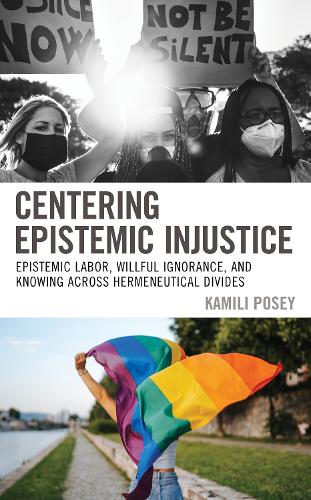
Centering Epistemic Injustice: Epistemic Labor, Willful Ignorance, and Knowing Across Hermeneutical Divides
(Hardback)
Publishing Details
Centering Epistemic Injustice: Epistemic Labor, Willful Ignorance, and Knowing Across Hermeneutical Divides
By (Author) Kamili Posey
Bloomsbury Publishing PLC
Lexington Books
23rd August 2021
United States
Classifications
Professional and Scholarly
Non Fiction
Human rights, civil rights
Sociology
172.2
Physical Properties
Hardback
162
Width 160mm, Height 230mm, Spine 19mm
431g
Description
In Centering Epistemic Injustice: Epistemic Labor, Willful Ignorance, and Knowing Across Hermeneutical Divides, Kamili Posey asks what it means for accounts of epistemic injustice to take seriously the lives and perspectives of socially marginalized knowers. The first part of this book takes up the predominant account of testimonial injustice offered by Miranda Fricker, arguing that testimonial injustice is not merely about the epistemic harms perpetrated by dominant knowers against marginalized knowers, but also about the strategies that marginalized knowers use to circumvent those harms. Such strategies expand current conceptions of epistemic injustice by centering how marginalized knowers engage and resist in hostile epistemic environments. The second part of the book examines Frickers concept of hermeneutical injustice, rooted in hermeneutical marginalization. Thinking alongside critics of hermeneutical injustice, Centering Epistemic Injustice explores the relationship between dominant knowing and marginalized knowing and asks if social powerincluding the power to shape collective resources and ways of meaning-makingmakes it impossible for dominant knowers to know and hear well across hermeneutical divides. Finally, the book asks whether hermeneutical divides are real divides in understanding and how dominant knowers might come to be better knowers in the pursuit of a more thoroughgoing epistemic justice.
Reviews
By focusing on the epistemic practices of marginalized groups, Kamili Posey provides a timely expansion of Miranda Frickers concept of epistemic injustice, introducing new concerns for, and providing novel solutions to, aperhaps thecentral problem in epistemology and social justice. For Posey, achieving epistemic justice requires shifting epistemic burdens from marginalized knowers to dominant knowers at the societal and institutional, rather than the individual, level. Addressing questions of epistemic injustice from the perspective of race, Poseys book provides both a refreshing assessment of the existing literature as well as a bold proposal for future work. It will be a 'must-read' for anyone interested in the connections between epistemology, social justice, philosophy of race, and political philosophy. -- Amanda Favia, Nassau Community College
Poseys book makes a compelling case for a fresh approach to epistemic injustice, grounded in the perspective of marginalized knowers and shifting focus from individual remedies and 'epistemic charity' to the questions of social power that lie at the root of the problem. It is essential reading for anyone interested in epistemic injustice and related issues. -- Ornaith O'Dowd, University of Cincinnati Blue Ash College
Author Bio
Kamili Posey is assistant professor of philosophy at the City University of New York, Kingsborough.
